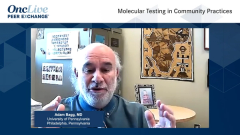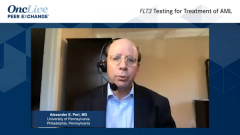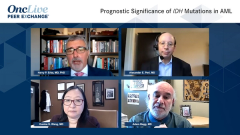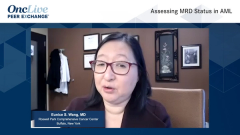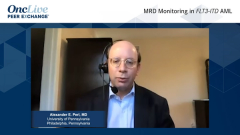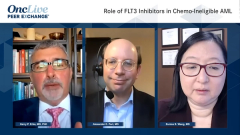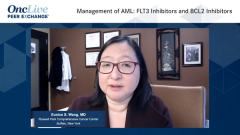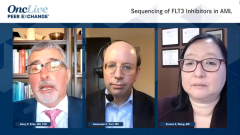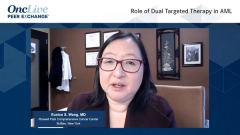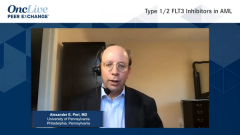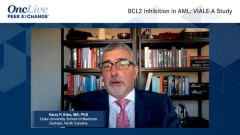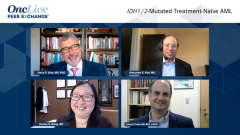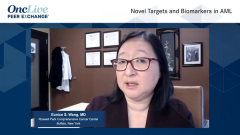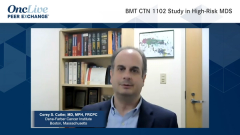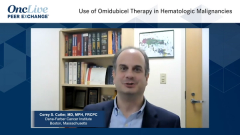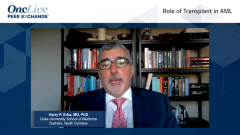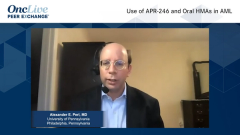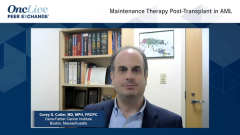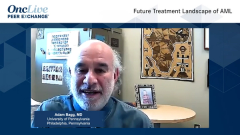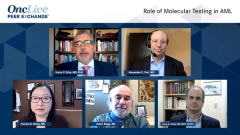
Role of FLT3 Inhibitors in Chemo-Ineligible AML
Episodes in this series

Harry P. Erba, MD, PhD: In this next section, want to focus on targeted therapies. More specifically, we are going to be talking about targeted therapies against FLT3 mutations, IDH mutations, and BCL2 mutations, and we will talk a bit about some investigational agents that are getting some of our attention. I want to start with an important topic, and that is the use of FLT3 inhibitors not for patients eligible for intensive chemotherapy. We know from the RATIFY trial, from the German study group, that the addition of midostaurin to intensive chemotherapy improved survival and other outcomes.
Sasha, I want to turn to you about what you do for patients who are unfit for intensive chemotherapy. They are not eligible by age or comorbidities but have a FLT3 mutation, whether that is an ITD or TKD mutation. How do you choose therapy for those patients?
Alexander E. Perl, MD, MS: I can tell you what we do at the University of Pennsylvania Perelman School of Medicine, but despite spending a lot of time studying FLT3 mutations and trying to be as expert as possible in FLT3, I do not know that what I am doing is the right thing. One problem we have is that there are a bunch of different options, and we do not know what the proper 1 is. We have good data from the VIALE-A study in patients who are unfit for intensive frontline chemotherapy to say that a combination regimen that includes venetoclax is better than a single-agent regimen with either a hypomethylating agent or low-dose cytarabine, which I do not commonly use as a single agent.
Most typically, I use venetoclax with azacitidine the same way it was used in the New England Journal of Medicine paper recently published by Courtney DiNardo and colleagues, which showed a survival benefit for venetoclax plus azacitidine over azacitidine plus placebo. In that study, they did a subgroup analysis of a bunch of different molecular mutations, including FLT3. They did not break out ITD vs TKD in that study, but they showed that both responses were higher in the combination arm and that survival was better in the combination arm. For the question of what is better, azacitidine vs venetoclax plus azacitidine, venetoclax plus azacitidine beats out azacitidine alone in patients with FLT3 mutations, with all those caveats. There are no alternatives.
Eunice S. Wang, MD: I disagree with that, Sasha. The hazard ratio on that VIALE-A trial was overlapping. For patients with FLT3 mutations, I am not 100% sure that is correct. I know that Marina Konopleva presented data from her group at The University of Texas MD Anderson Cancer Center at the 2020 ASH [American Society of Hematology] Annual Meeting saying that there was no statistical difference between those who got azacitidine alone vs venetoclax-azacitidine at their institute. I would have to throw that out there.
Alexander E. Perl, MD, MS: You are taking the words out of my mouth. I was going to say that, if you look at the point estimate, it was 0.66 for patients with FLT3 mutations. For the whole study, it was like 0.66 for everybody, which looks the same, but the confidence interval exceeded 1. When you look at that, without the caveats that it is a combination of ITD and TKD, and you break out those mutations, there was no difference in the data that Marina presented for the ITD-positive patients, which raises the question: Should we be adding venetoclax to these patients in the frontline setting? The TKD-positive patients did better, but there was not as clear a benefit there, which brings up a study that you presented in which a FLT3 inhibitor was added to azacitidine: gilteritinib plus azacitidine. That trial is in progress, so we need to see how the trial reads out, but it is at least a feasible approach. You can comment more on the data that you presented, but that is 1 alternative that is about giving a FLT3 inhibitor with a hypomethylating agent.
Transcript Edited for Clarity


